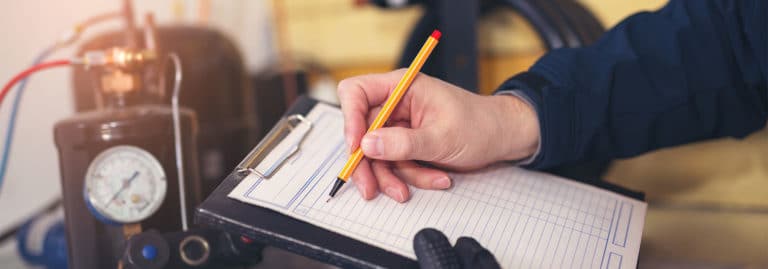Replace or Repair: Handling Issues with Your Evaporator Coil
If you are facing issues with your AC system and your technician has identified a problem with your evaporator coil, it may not be clear how you should proceed. While of course you want the system to continue working, a full replacement is an investment not to be taken lightly. Can a replacement be a good option? How can you tell? Our team can help.
What Is an Evaporator Coil?
Your HVAC system’s evaporator coil is a critical part of its everyday function no matter what season you’re in. It helps keep things cool in the summer, pulls in warmth in the winter, and even can act as a dehumidifier, pulling moisture out of the air.
Causes of Evaporator Coil Problems
There are numerous things that could cause an evaporator coil to go off the rails – some of them are inevitable, but others are preventable with a little care.
Some of the more common causes include:
- Improper maintenance: Many homeowners do not give their home’s systems the level of care they require. Some are trying to save money, others are simply unaware that such a thing is needed. Whatever the case, keeping an AC system in good condition through routine maintenance can go a long way toward preventing issues like these.
- Dirty filters or condenser coils: Your home comfort system cycles a truly incredible amount of air every single day. The sheer volume of dust and debris in the air makes it extremely important that you pay attention to things like system cleaning. Buildup on these parts can lead to extensive damage and a system that does not operate as powerfully or efficiently as it should.
- Incompatible refrigerant: If an incompatible refrigerant was introduced to your system for any reason, it can result in a system breakdown.
- Wear and tear: The longer a unit has been in operation, the more likely it is that problems will crop up. Sometimes it will be a result of the above problems adding up over time, but it can also simply be a case of moving parts wearing down over time.
When to Replace vs. Repair
When the coils on the evaporator unit weaken – generally due to at least one of the issues listed above – cracks may develop, allowing refrigerant to leak out. In some cases, an otherwise healthy system may develop a single small hole which can be sealed. In other cases, it may be reasonable to replace only the faulty evaporator coil, leaving the rest of the system untouched.
However, there are certainly times when it would be more beneficial in the long run to replace the entire system. These situations include:
- Having an AC system that is 10+ years old: Even top-of-the-line models of air conditioners are not built to last forever. If yours is already past its projected useful life, it may be cheaper in the long term to replace it, rather than deal with constant repairs and piecemeal part replacements. Between that and the virtually guaranteed improvement in efficiency and performance, this upgrade is a smart one.
- Your evaporator coil is obsolete: Older models are also likely to have parts that are below the current minimum requirements for SEER (Seasonal Energy Efficiency Ratio) ratings. This means that coils for these models are either very difficult to come by, or are not made anymore at all.
- Your system uses R-22 refrigerant: Also known as Freon, R-22 was the refrigerant of choice for decades. However, since discovering its negative impact on the environment, its use has been phased out, and as of January 2020, its production and import has been banned entirely. If your system runs on this refrigerant, it will be extremely expensive, if not impossible, to make any repairs.
Prevention Is Key
To minimize damage to your evaporator coil as much as possible, routine maintenance is one of the biggest things a homeowner can do.
Reach out to our team at Airrific Air Conditioning and Heating today to schedule your top-quality AC maintenance service!
Need Air Conditioning Maintenance? Talk to your air conditioning repair experts at Airrific Air Conditioning & Heating today! Call (941) 371-3355.







